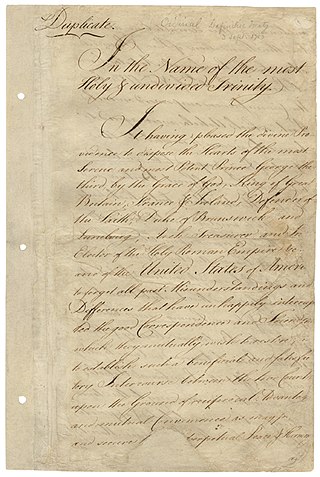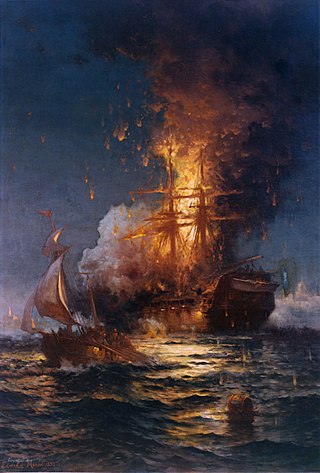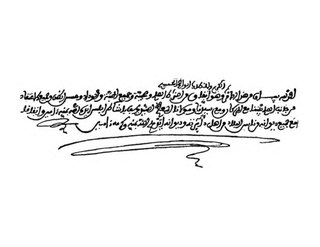
Tripoli is the capital and largest city of Libya, with a population of about 1.183 million people in 2023. It is located in the northwest of Libya on the edge of the desert, on a point of rocky land projecting into the Mediterranean Sea and forming a bay. It includes the port of Tripoli and the country's largest commercial and manufacturing center. It is also the site of the University of Tripoli. The vast Bab al-Azizia barracks, which includes the former family estate of Muammar Gaddafi, is also located in the city. Colonel Gaddafi largely ruled the country from his residence in this barracks.

The Treaty of Paris, signed in Paris by representatives of King George III of Great Britain and representatives of the United States on September 3, 1783, officially ended the American Revolutionary War and recognized the Thirteen Colonies, which had been part of colonial British America, as an independent, sovereign nation.

The First Barbary War (1801–1805), also known as the Tripolitan War and the Barbary Coast War, was a conflict during the Barbary Wars, in which the United States and Sweden fought against Tripolitania. Tripolitania had declared war against Sweden and the United States over disputes regarding tributary payments made by both states in exchange for a cessation of Tripolitatian commerce raiding at sea. United States President Thomas Jefferson refused to pay this tribute. Sweden had been at war with the Tripolitans since 1800.

The Barbary Wars were a series of two wars fought by the United States, Sweden, and the Kingdom of Sicily against the Barbary states and Morocco of North Africa in the early 19th century. Sweden had been at war with the Tripolitans since 1800 and was joined by the newly independent US. The First Barbary War extended from 10 May 1801 to 10 June 1805, with the Second Barbary War lasting only three days, ending on 19 June 1815.

The Second Barbary War (1815) or the U.S.–Algerian War was fought between the United States and the North African Barbary Coast states of Tripoli, Tunis, and Algiers. The war ended when the United States Senate ratified Commodore Stephen Decatur's Algerian treaty on 5 December 1815. However, Dey Omar Agha of Algeria repudiated the US treaty, refused to accept the terms of peace that had been ratified by the Congress of Vienna, and threatened the lives of all Christian inhabitants of Algiers. William Shaler was the US commissioner in Algiers who had negotiated alongside Decatur, but he fled aboard British vessels during the 1816 bombardment of Algiers. He negotiated a new treaty in 1816 which was not ratified by the Senate until 11 February 1822, because of an oversight.

The Treaty of Tripoli was signed in 1796. It was the first treaty between the United States and Tripoli to secure commercial shipping rights and protect American ships in the Mediterranean Sea from local Barbary pirates.

William Eaton was a United States Army officer and the diplomatic officer Consul General to Tunis (1797–1803). He played an important diplomatic and military role in the First Barbary War between the United States and Tripoli (1801–1805). He led the first foreign United States military victory at the Battle of Derne by capturing the Tripoli subject city of Derne in support of the restoration of the pasha, Hamet Caramelli. He also gave testimony at the treason trial of former Vice President Aaron Burr. Eaton served one term in the General Court of Massachusetts, which is the state legislature both during and after the colonial era. Eaton died on June 1, 1811, at the age of 47.

The Barbary pirates, Barbary corsairs, or Ottoman corsairs were mainly Muslim pirates and privateers who operated from the Barbary states. This area was known in Europe as the Barbary Coast, in reference to the Berbers. The main purpose of their attacks was to capture slaves for the Barbary slave trade. Slaves in Barbary could be of many ethnicities, and of many different religions, such as Christian, Jewish, or Muslim. Their predation extended throughout the Mediterranean, south along West Africa's Atlantic seaboard and into the North Atlantic as far north as Iceland, but they primarily operated in the western Mediterranean. In addition to seizing merchant ships, they engaged in razzias, raids on European coastal towns and villages, mainly in Italy, France, Spain, and Portugal, but also in the British Isles, the Netherlands, and Iceland.
The Barbary Treaties refer to several treaties between the United States of America and the semi-autonomous North African city-states of Algiers, Tunis, and Tripoli, under the rule of the Ottoman Empire, known collectively as the Barbary States.
The Treaty with Tunis was signed on August 28, 1797, between the United States of America and the Barbary State of Tunis. As the treaty provided in Article One:

The Battle of Derna at Derna, Cyrenaica, was the decisive victory in April–May 1805 of a mercenary army recruited and led by United States Marines under the command of U.S. Army Lieutenant William Eaton, diplomatic Consul to Tripoli, and U.S. Marine Corps First Lieutenant Presley Neville O'Bannon. The battle involved a forced 521-mile (839-km) march through the North African desert from Alexandria, Egypt, to the eastern port city of Derna, Libya, which was defended by a much larger force.
The Karamanli dynasty was an autonomous dynasty that ruled Ottoman Tripolitania from 1711 to 1835. Their territory comprised Tripoli and its surroundings in present-day Libya. At its peak, the Karamanli dynasty's influence reached Cyrenaica and Fezzan, covering most of Libya. The founder of the dynasty was Ahmed Karamanli, a descendant of the medieval Karamanids. The most well-known Karamanli ruler was Yusuf ibn Ali Karamanli who reigned from 1795 to 1832, who fought a war with the United States between 1801 and 1805. Ali II was the last of the dynasty.
Yusuf Karamanli, Caramanli or Qaramanli or al-Qaramanli, (1766–1838) was the longest-reigning Pasha of the Karamanli dynasty of Tripolitania. He is noted for his role in the Barbary Wars against the United States.

Ottoman Tripolitania, also known as the Regency of Tripoli, was officially ruled by the Ottoman Empire from 1551 to 1912. It corresponded roughly to the northern parts of modern-day Libya in historic Tripolitania and Cyrenaica. It was initially established as an Ottoman province ruled by a pasha (governor) in Tripoli who was appointed from Constantinople, though in practice it was semi-autonomous due to the power of the local Janissaries. From 1711 to 1835, the Karamanli dynasty ruled the province as a de facto hereditary monarchy while remaining under nominal Ottoman suzerainty. In 1835, the Ottomans reestablished direct control over the region until its annexation by Italy in 1912.

The Treaty of Amity and Commerce established formal diplomatic and commercial relations between the United States and France during the American Revolutionary War. It was signed on February 6, 1778 in Paris, together with its sister agreement, the Treaty of Alliance, and a separate, secret clause allowing Spain and other European nations to join the alliance. These were the first treaties negotiated by the fledgling United States, and the resulting alliance proved pivotal to American victory in the war; the agreements are sometimes collectively known as the Franco-American Alliance or the Treaties of Alliance.

In July 2001, President Abdelaziz Bouteflika became the first Algerian President to visit the White House since 1985. This visit, followed by a second meeting in November 2001, and President Bouteflika's participation at the June 2004 G8 Sea Island Summit, is indicative of the growing relationship between the United States and Algeria. Since the September 11 attacks in the United States, contacts in key areas of mutual concern, including law enforcement and counter-terrorism cooperation, have intensified. Algeria publicly condemned the terrorist attacks on the United States and has been strongly supportive of the international war on terrorism. The United States and Algeria consult closely on key international and regional issues. The pace and scope of senior-level visits has accelerated.

The Treaty of Amity and Commerce between the Kingdom of Prussia and the United States of America was a treaty negotiated by Count Karl-Wilhelm Finck von Finckenstein, Prussian Prime Minister, and Thomas Jefferson, United States Ambassador to France, and signed by Frederick the Great and George Washington. The treaty officially established commercial relations between the Kingdom of Prussia and the United States of America and was the first one signed by a European power with the United States after the American Revolutionary War. The Kingdom of Prussia became therefore one of the first nations to officially recognize the young American Republic after the Revolution. The first nation to recognize the US was Sweden, who during the Revolution signed a Treaty of Amity and Commerce.

The Tripolitanian civil war was a conflict from 1790 to 1795 which occurred in Tripolitania – inside what is today the country of Libya. It involved a war of succession between leading members of the Karamanli dynasty, an intervention by Ottoman officer Ali Burghul who claimed to be acting on the sultan's orders and controlled Tripoli for 17 months, and an intervention by the bey of Tunis Hammuda ibn Ali to restore the Karamanlis to power.

A Treaty of Peace and Friendship was signed between the United States and the Regency of Algiers on 5 September 1795.














